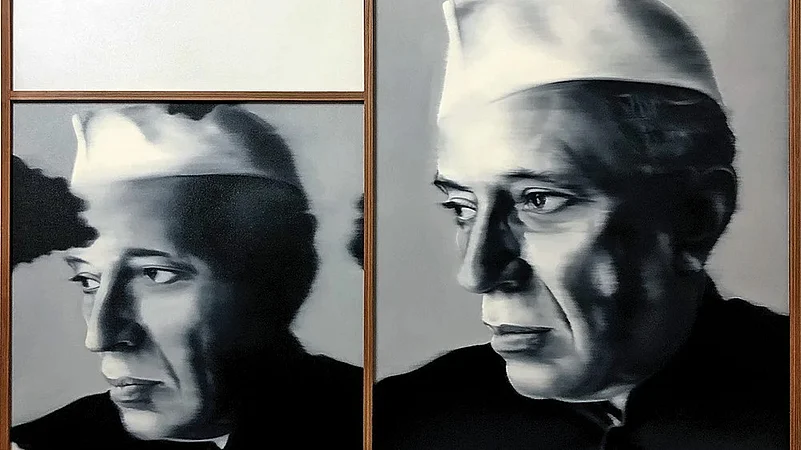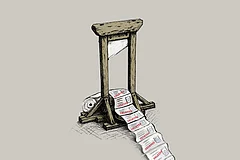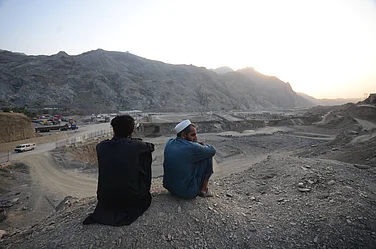
India’s governance rests on institutions maintaining independence from political influence.
When public institutions succumb to partisanship, their legitimacy erodes.
Once public trust is shaken, it weakens the Republic itself.
Wise voices over the centuries and across civilisations have warned us that it takes a society decades to build and sustain institutions, but these very carefully crafted and nurtured arrangements can be thoughtlessly damaged and destroyed within months and weeks.
It seems, unfortunately, we have entered an age of demolition and destruction of assiduously cultivated political and constitutional institutions in the democratic world. In the United States, one of the oldest formalised democracies, an arrogant president is running amok, undermining every single institutional setup.
We, in India, are having a tough time maintaining and respecting the integrity and autonomy of our institutions. All said and done, our rendezvous with democracy is only seven decades old, whereas our social and cultural ethos remains predicated on centuries-old feudal values and practices. In this context, it is worthwhile to revisit the most consequential leap of faith our founding fathers took when writing the Constitution—and then, diligently observing its injunctions.
Consider these brief excerpts from Prime Minister Jawaharlal Nehru’s correspondence with his cabinet colleagues in 1953.
On April 24, he wrote a “My dear Balkrishna” letter to B.V. Keskar, Union Minister for Information and Broadcasting. “I wonder if you know Parmanand Desai. He is Mahadev Desai’s younger brother. He did well here and then at Sardar Patel’s instance and my suggestion also, he went, I think, to America for a two-year course of training in diplomacy etc. When he came back, he was overage for the Foreign Service…ultimately, we managed to put him in the Historical Division temporarily. After a year was over, we referred this matter to the Public Service Commission who expressed its resentment at anyone having been appointed without its previous consent. Subsequently, his case was put up to them in the normal course and they did not approve,” it said.
Rebuffed by the Union Public Service Commission (UPSC), Nehru pleaded with his colleague to explore the “possibility of your utilising his services”.
Now, we move to May 1953.
T.T. Krishnamachari, the Minister for Commerce and Industry, referred to Nehru the case of one L. Natarajan, who had topped the Indian Railway Service Engineers examination, but was denied an appointment because, according to police records, he was associated with the Student Federation of the Communist Party of India.
TTK ended his letter to the Prime Minister with a gentle taunt: “Who is ruling over this country, the police or Jawaharlal Nehru?”
Nehru wrote to both the Home Minister, Kailash Nath Katju, and the Railway Minister, Lal Bahadur Shastri, pointing out that “many brilliant young men are attracted to the communist doctrine” and democratic India should have the confidence to let them enter the system.
The all-sacred “police verification” report could not become an all-pervasive consideration.
In June 1953, Rafi Ahmed Kidwai, one of Nehru’s most trusted ministerial colleagues, was keen to accommodate one Raja Bajrang Bahadur Singh of Bhadri as “Cattle Utilisation Adviser” in his Ministry of Food and Agriculture. It was a pure patronage job that the minister was trying for one of his political cronies. The UPSC demurred. The “Raja” had no technical qualification.
The matter was referred to Nehru. The prime minister told Kidwai: “We ought not to go against the wishes of the UPSC in this matter and we should try to get some person with technical and expert knowledge.”
The bottom line: the new leadership (Nehru had just won the first Lok Sabha election with a decisive majority for his Congress Party) was willing to undertake restraint on its power and was consciously investing in building up the reputation and autonomy of an institution.
Institutions prepare and infuse individuals and citizens with a lawful political and constitutional spirit, and make everyone respectful of boundaries. Only tycoons and criminals think of themselves above the restraints of law.
In 1953, as Prime Minister, Nehru was educating his colleagues on the sanctity of the UPSC as an institution. A few years earlier, Nehru himself was admonished by Sardar Patel when, as an impatient and new prime minister, he wanted to bypass the federal public service commission in a matter of inducting someone in the Foreign Service.
One of the great achievements of Nehruvian India, undoubtedly, is the manning of our bureaucracy. We have moved away from the feudal practices of hereditary entitlement; it is firmly established that the recruitment to public offices—from the Cabinet Secretary down to the lower-division officer—would be on merit, through an open competition.
Thanks to the autonomous functioning of the UPSC, many generations of Indian men and women have made it to the Indian Administrative Service, the Indian Police Service, and the Indian Foreign Service purely on merit. These, in turn, have sustained and enriched the Indian state and its governmental stability, setting the stage for national growth and prosperity.
Like the UPSC, institutions are meant to be empowered and are the authorised bulwark against arbitrariness in a civilised society. That means a maximum, if not total, elimination of personal considerations, whims, and fancies in the conduct of public offices.
The operational principle is that the authority of the state is not to be exercised outside the prescribed norms and rules; state power is to be wielded in an accountable manner. That is the essence of the rule of law.
An institution has its own legacy and traditions of “good practices.” That means protocol and proprieties have to be observed by everyone, including those who come to preside over the institution.
Every institution comes to develop its own organisational culture, ensuring ethical values and norms over whimsical and dictatorial behaviour. Healthy institutions are defined by well-observed rules and a code of conduct.
The onus rests on those who get to man the public institutions. The appointment is made by the political executive but those who get selected to preside over public institutions are expected to shed their baggage of personal ties and political preferences. Democratic norms demand that a high court judge or a vice-chancellor of a university would not be guided by political partisanship in the discharge of her duties.
T.N. Seshan is a textbook example. He had a reputation for being a very servile officer, but once appointed as the Chief Election Commissioner, he uncompromisingly carved out and defended his autonomy. He infuriated those who had appointed him and thought he would do their bidding at the Nirvachan Sadan, and he delighted those who had felt dismayed at this appointment in the first place.
The one and only lesson of the last seventy-five years of our Republic is that an institution loses its legitimacy, acceptability and respectability (if not its legal writ), if those who preside over it fail to garner tacit consent from all stakeholders. Once an institution loses its trustworthiness, a kind of lawlessness seeps into the body politic.
Every political institution faces a moment of reckoning in times of intense political partisanship. There are times when a Governor of the Reserve Bank of India or the Chief Justice of India could feel seduced by the righteous demagogue and submit herself to the rhetorical blandishment of the ruling politician. It requires personal rectitude, intellectual bandwidth, ethical mooring, and an appreciation of our constitutional arrangements not to stray away from the path of neutrality, autonomy, and non-partisanship. The Election Commission, under the incumbent commissioners, has patently failed the test. A bad turn for the Republic.
(Harish Khare is a Delhi-based senior journalist and public commentator)
Democracy is about ballots, but also about memory—who safeguards both, and who seeks to rewrite them? Outlook’s September 11, 2025 issue probes these erasures—of voters, voices, and histories—asking what they mean for India’s democratic future. This article appeared in print as 'The Iron in the Institutions'.



































